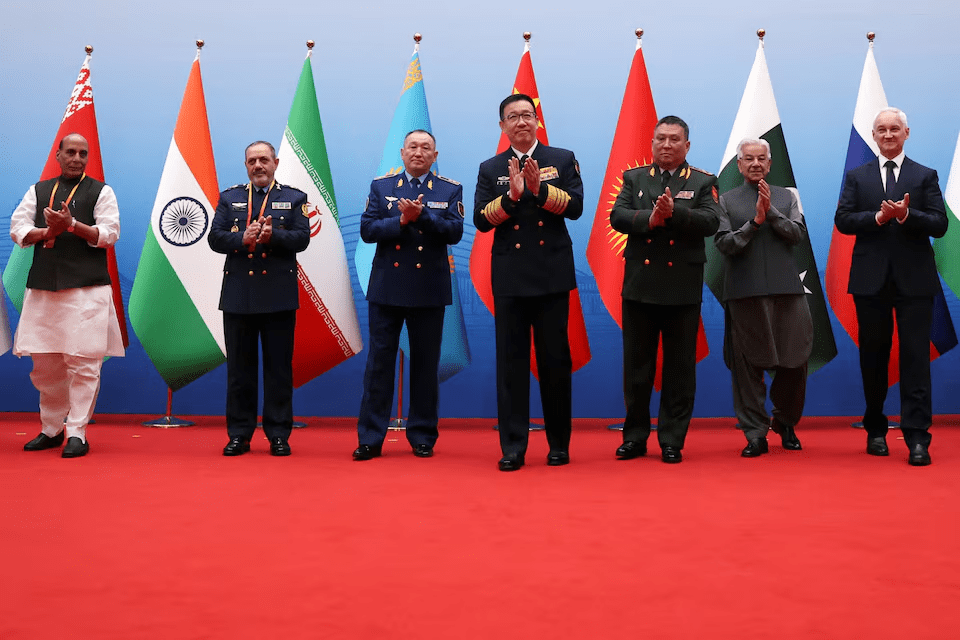The Ministers of Defense of the Shanghai Cooperation Organization (SCO) could not adopt a joint declaration at their meeting in Qingdao, China, after India refused to sign the document, saying that it was pro-Pakistan for not having referred the April attack on Indian tourists.
The OCS is an Eurasian security and political block of 10 members including China, Russia, India, Pakistan, Iran and several Central Asian states. The Meeting of Defense Ministers took place before the summit of annual leaders later scheduled for this year.
Federal Defense Minister Khawaja Muhammad Asif led the Pakistan delegation at the meeting, where he reaffirmed the country’s commitment to regional stability, collective security and cooperation against terrorism.
In his speech, the Minister condemned the recent military actions of Israel against Iran and the violence continues in Gaza while calling for peaceful resolutions to long -standing global disputes, including cashmere and Palestine.
Learn more: SCO brings Pakistan together, the Ministers of Defense in India
Stressing the importance of the SCO as a platform for dialogue, mutual trust and regional cooperation, Mr. Asif reiterated Pakistan’s commitment to the principles of the United Nations Charter and the SCO Charter, describing them as essential to promote world peace, good neighborhood relations and multi-way collaboration.
He also condemned the recent terrorist attack in Jammu and Kashmir (IIOJK), illegally occupied, urging the international community to hold those who finance and support such acts. He also described the bombing of Jaffar Express in Balutchistan as another example of cross -border terrorism undergoing regional peace.
Stressing unresolved conflicts as serious threats to global stability, Mr. Asif underlined the need for a peaceful resolution of questions such as cashmere and Palestine by diplomacy, mediation and sustained dialogue.
However, the meeting would have faced a setback when India refused to approve the final declaration, arguing that it favored the position of Pakistan. The Indian delegation opposed the omission of any reference to the attack of April 22 against Hindu pilgrims in Iiojk, in which 26 people were killed.
India blamed Pakistan for the incident, an accusation of Islamabad firmly rejected. The attack led to some of the most intense cross-border exchanges for years, after India claimed to have targeted “terrorist infrastructure” in Pakistan and Azad Jammu-et-Cachemire.
Pakistan denied the accusation, declaring that the targeted sites were of a civil nature and had no connection with terrorism.
Also read: Rajnath to attend the SCO summit in China
Citing anonymous sources, the foreign news agency reported that the Indian Minister of Defense, Rajnath Singh, thought that the press release “diluted India’s position on critical issues such as terrorism and regional security”.
Singh would have said that the joint declaration “suited Pakistan’s account” because it omitted the April attack but included a mention of terrorist activity in Balutchistan – a region where Pakistan has long accused India of supporting separatist elements, allegations that New Delhi Nie.
“Some members, member countries, have not been able to achieve consensus on certain issues and, therefore, the document could not be finalized on our side,” the spokesman for the Indian Foreign Ministry, Randir Jaiswal, for journalists said during a weekly press briefing.
“India wanted concerns about terrorism reflected in the document, which was not acceptable in a particular country and, therefore, the declaration was not adopted,” he said, without naming the country.
The Qingdao meeting marked the first time that the senior ministers of India and Pakistan have shared a scene since their military deadlock in May.




